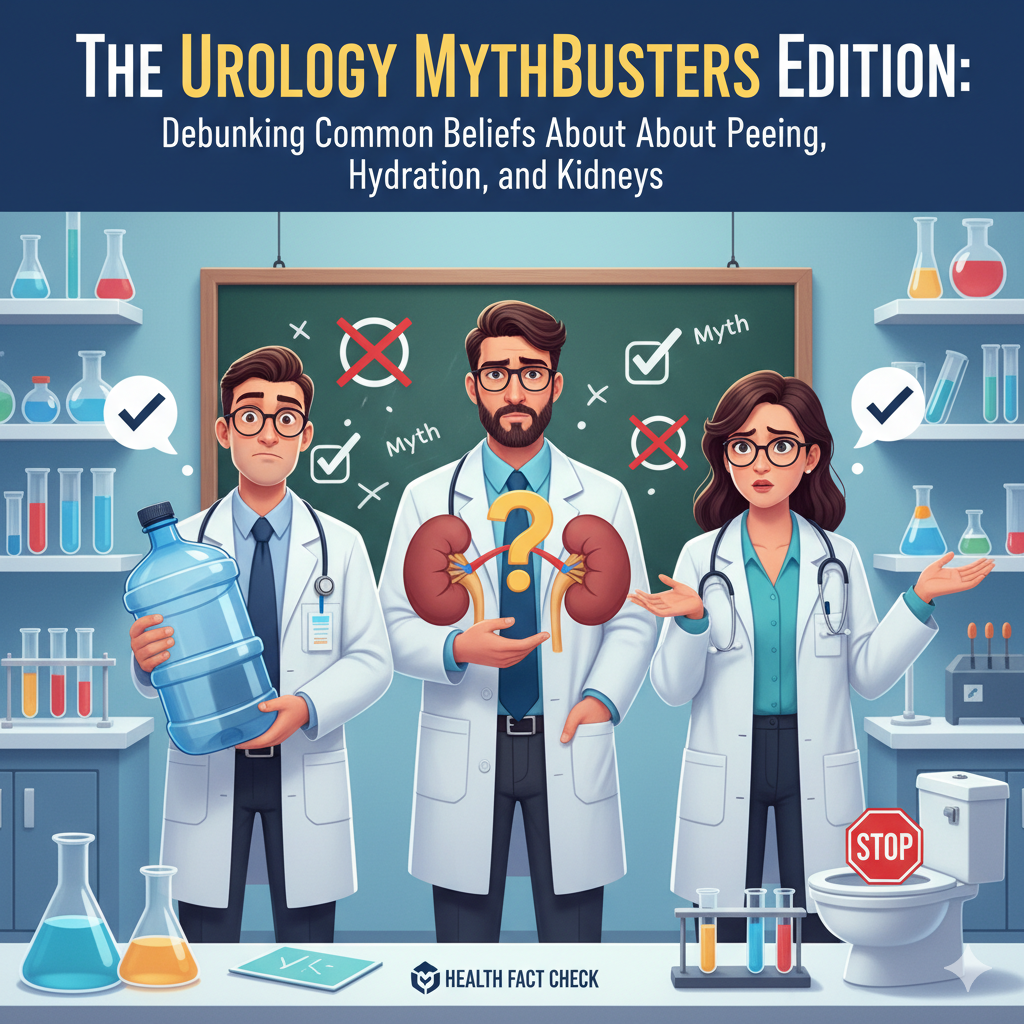Alright, folks, gather ’round! Today, we’re putting on our lab coats and safety goggles for a deep dive into the fascinating world of urology. Our mission? To bust some pervasive myths about peeing, staying hydrated, and the incredible organs we call kidneys. You might be surprised by what you learn!
Myth #1: You Must Drink Eight Glasses of Water a Day
This one is perhaps the most famous hydration “rule” out there, but it’s more of a guideline than a strict command.
The Reality: While staying hydrated is crucial for overall health, the “eight glasses” rule doesn’t account for individual differences in activity level, climate, diet, and body size. Your body’s needs fluctuate! A better indicator of hydration is the color of your urine – aim for a pale yellow. Listen to your body’s thirst cues, and remember that fluids also come from foods like fruits and vegetables.
Myth #2: Holding Your Pee Can Cause a Bladder Infection
Many people believe that delaying urination can directly lead to a urinary tract infection (UTI).
The Reality: While it’s not ideal to consistently hold your urine for extended periods, doing so occasionally typically won’t cause a UTI. UTIs are primarily caused by bacteria entering the urethra and traveling to the bladder. However, frequently holding urine can overstretch the bladder, potentially weakening its muscles over time, and in some cases, it might increase the risk of infection by allowing bacteria more time to multiply if they are already present. It’s generally best to go when nature calls!
Myth #3: Cranberry Juice Cures UTIs
This is a popular home remedy, often touted as a UTI cure-all.
The Reality: While some studies suggest that cranberry products (particularly concentrates) may help prevent UTIs by stopping bacteria from adhering to the bladder wall, they are not a cure for an active infection. If you suspect you have a UTI, it’s essential to see a doctor for diagnosis and appropriate antibiotic treatment. Relying solely on cranberry juice for an infection can delay necessary medical care.
Myth #4: Frequent Urination Always Means a Small Bladder or a Problem
Worrying about how often you visit the restroom? You’re not alone.
The Reality: “Frequent” urination is subjective. What’s normal for one person might be considered frequent for another. Factors like hydration levels (drinking a lot of water will naturally make you pee more), caffeine intake, certain medications, and even anxiety can increase urination frequency. While frequent urination can be a symptom of conditions like overactive bladder, diabetes, or a UTI, it’s not always indicative of a problem. If it’s accompanied by pain, urgency, or blood, definitely consult a doctor.
Myth #5: Kidney Stones Only Happen to People Who Don’t Drink Enough Water
While hydration is a key factor, it’s not the only one.
The Reality: Dehydration is a significant risk factor for kidney stones because it allows stone-forming minerals to become more concentrated in the urine. However, genetics, diet (high sodium, excessive animal protein, or certain oxalate-rich foods), obesity, and certain medical conditions can also contribute to stone formation, even in people who drink a reasonable amount of water. Staying well-hydrated is crucial for prevention, but it’s not a foolproof shield.
Myth #6: Your Kidneys Hurt When Something is Wrong
Not always! The kidneys are often silent sufferers.
The Reality: While severe kidney problems like large kidney stones or infections can cause significant pain (often felt in the back or flank), many chronic kidney diseases progress without noticeable symptoms in their early stages. This is why regular check-ups and monitoring for risk factors like high blood pressure and diabetes are so important. By the time symptoms appear, the disease may be advanced.
The Bottom Line
Our urinary system and kidneys are incredible, hardworking organs. Understanding how they function and separating fact from fiction empowers us to make better choices for our health. Don’t let myths mislead you! When in doubt, always consult a healthcare professional for personalized advice and accurate information.
Stay hydrated (sensibly!), listen to your body, and keep those myths busted!

